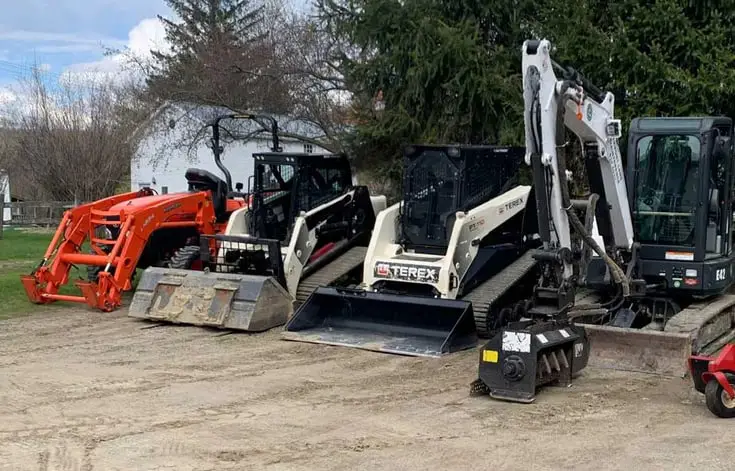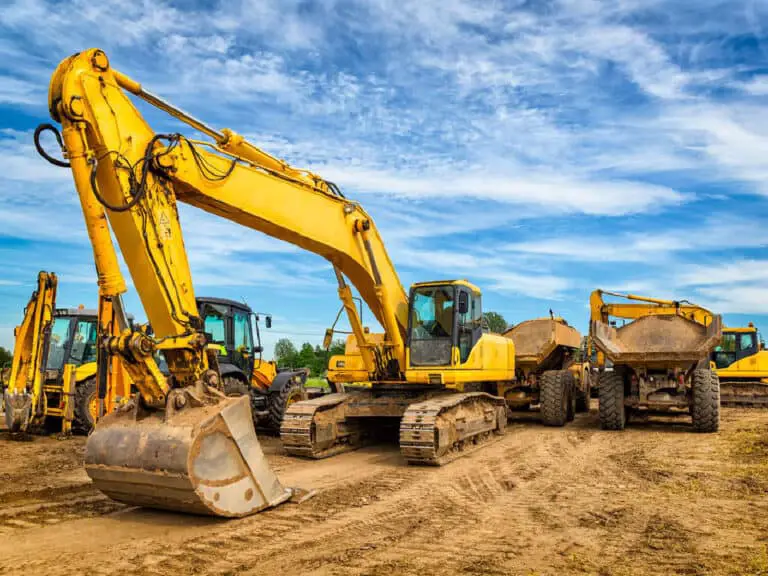How to Start a Land Clearing Business (Helpful Tips for Beginner)

Have you ever driven by a wooded area and wondered what it would look like if all those trees and brush were gone? Maybe you’ve thought about how much space could be opened up if only there were a way to quickly and efficiently clear the land.
Well, starting a land clearing business could be the solution you’re looking for! With the rise of new housing developments and commercial construction projects, the demand for land clearing services has never been higher.
If you’re someone who enjoys working outdoors and has a passion for making a tangible difference in the world around you, starting a land clearing business might be the perfect career move for you.
In this article, we’ll discuss the steps you need to take to get your business up and running, from developing a business plan to marketing your services on social media. So let’s grab our chainsaws and get to work!
Understanding the Land Clearing Business
Before starting a land clearing business, it is essential to understand what it is and why it is necessary. Land clearing involves removing trees, shrubs, and other vegetation from a property to make it suitable for construction or other purposes. It may also involve removing debris, rocks, and other obstacles from the land.
Land clearing is necessary for a variety of reasons. Construction companies need to clear land to build roads, buildings, and other infrastructure. Homeowners may need land clearing to remove trees and shrubs that pose a safety hazard or to make room for a garden or other landscaping. Businesses may require land clearing to expand their operations or create new facilities.
There are different types of land clearing services, including:
- Brush clearing: This involves removing small trees, shrubs, and other vegetation.
- Tree removal: This involves removing trees of various sizes.
- Stump removal: This involves removing tree stumps from the ground.
- Excavation: This involves removing soil and other materials to prepare the land for construction.
Identify Your Target Market
Identifying your target market is a critical step in starting a land clearing business. Knowing who your ideal customer is can help you tailor your marketing efforts and provide services that meet their specific needs.
The first step in identifying your target market is to research the local market. Look at the competition in your area and see what services they offer, who they target, and what their pricing is. This can give you a good idea of what services are in demand and who your competitors are targeting.
Once you have an idea of the local market, you can start to identify your ideal customer. Consider the types of property owners or developers who would need land clearing services. Are they commercial or residential?
Are they building new structures or clearing land for agricultural use? Understanding the specific needs of your target market can help you tailor your services to meet those needs.
Another factor to consider is the geographic location of your target market. Are they in urban or rural areas? Are they in a specific region or state? Knowing the geographic location of your target market can help you determine your service area and ensure that you are targeting the right customers.
You should also consider the demographic characteristics of your target market. Age, gender, income level, and education level can all play a role in determining who your ideal customer is. For example, if you are targeting commercial property owners, you may want to focus on businesses that have a large land area, such as golf courses or parks. If you are targeting residential property owners, you may want to focus on affluent neighborhoods with large yards.
By identifying your target market, you can develop marketing strategies that will resonate with your ideal customer. For example, if you are targeting residential property owners, you may want to focus on social media advertising and direct mail campaigns. If you are targeting commercial property owners, you may want to focus on industry events and networking opportunities.
Machinery Required for Land Clearing
Land clearing involves the removal of vegetation, trees, rocks, and other debris from a piece of land to prepare it for construction or agricultural purposes. To do this effectively and efficiently, a variety of machinery is required.
1. Bulldozer
One essential piece of equipment for land clearing is a bulldozer. A bulldozer is a heavy-duty vehicle with a large blade on the front that is used to push and move large amounts of soil, debris, and vegetation. The bulldozer is particularly useful for clearing large areas of land quickly and efficiently.
2. Excavator
Another critical piece of equipment is an excavator. An excavator is a versatile machine that is used to dig, scoop, and move soil, rocks, and debris. It is particularly useful for removing stumps, digging trenches, and clearing rocky terrain. Excavators are available in various sizes and configurations, so it’s important to choose the right one for the job.
3. Skid Steers or Track Loaders
In addition to bulldozers and excavators, land clearing may also require the use of skid steers or track loaders. These machines are smaller and more agile than bulldozers and excavators, making them ideal for working in tight spaces or on more delicate terrain. They are also useful for loading and unloading trucks and trailers.
4. Chippers and Grinders
Chippers and grinders are also essential pieces of equipment for land clearing. Chippers are used to break down large branches and logs into smaller pieces, while grinders are used to turn wood and other organic debris into mulch. This mulch can then be used to help control erosion, retain moisture in the soil, and provide nutrients to newly planted vegetation.
5. Trucks and Trailers
Finally, trucks and trailers are necessary for transporting equipment, debris, and other materials to and from the job site. Depending on the size of the land clearing operation, a variety of trucks and trailers may be required to transport equipment and materials efficiently.
It’s important to note that not all land clearing jobs require every piece of equipment listed above. The specific machinery required will depend on the size and scope of the job, as well as the type of terrain being cleared. It’s important to assess the job requirements and choose the appropriate equipment to ensure efficient and safe land clearing operations.
Determine the Startup Costs
Before starting any business, it’s important to determine the startup costs. Starting a land clearing business can require a significant amount of upfront investment, so it’s essential to have a clear understanding of the costs involved.
The first step in determining startup costs is to develop a detailed business plan. This will help you identify all of the costs associated with starting and running your business. You should consider the cost of equipment, insurance, permits and licenses, marketing, and any other expenses that may arise.
One of the most significant expenses for a land clearing business is equipment. You will need to invest in heavy-duty machinery such as bulldozers, excavators, and skid steers, as well as hand tools like chainsaws and axes. You may also need to purchase trucks and trailers to transport your equipment to job sites.
The cost of equipment can vary widely depending on the size and type of machinery you need. It’s essential to do your research and purchase equipment that is durable, reliable, and within your budget.
Insurance is another critical expense to consider. As a land clearing business, you will be operating heavy machinery and working in hazardous conditions. It’s essential to have liability insurance to protect yourself and your business from potential lawsuits. You may also need workers’ compensation insurance if you plan to hire employees.
Permits and licenses are another expense that should not be overlooked. Depending on where you operate, you may need to obtain a variety of permits and licenses, such as a business license, a land use permit, or an environmental permit. These costs can add up quickly, so it’s essential to factor them into your startup costs.
Marketing is also an important expense to consider. You will need to invest in advertising and marketing efforts to attract new customers and build your brand. This can include developing a website, creating promotional materials, and running social media ads.
In addition to these expenses, there may be other costs to consider, such as legal fees, office space rental, and vehicle maintenance. It’s important to be as thorough as possible when developing your business plan to ensure that you have a clear understanding of all the costs involved in starting your land clearing business.
Getting Started in Land Clearing Business Ownership
Getting started in land clearing business ownership can be an exciting and rewarding journey, but it also requires careful planning and preparation. One of the first steps in starting your own land clearing business is to determine the type of services you will offer. This will depend on your skills, experience, and the needs of the local market.
Some common land clearing services include removing trees, clearing brush, grading and leveling land, and excavating. You may also choose to offer additional services such as landscaping, irrigation installation, or demolition. Once you have identified the services you will offer, it’s essential to research the local market and competition to determine the demand for your services and set competitive pricing.
Another crucial aspect of starting a land clearing business is to invest in high-quality equipment. As mentioned earlier, skid steer loaders, bulldozers, and dump trucks are essential pieces of machinery required to get the job done efficiently. However, investing in this equipment can be expensive, and it’s essential to budget accordingly and consider leasing options if necessary.
Once you have the necessary equipment, it’s essential to have a team of skilled employees to help you complete projects efficiently and safely. Hiring experienced operators and laborers can be challenging, but it’s crucial to have a qualified team to ensure the quality of your work and the safety of your employees.
As a business owner, it’s also crucial to have a strong understanding of accounting and financial management. Keeping accurate records of expenses, income, and taxes is essential for the long-term success of your business. You may choose to hire an accountant or invest in accounting software to help you manage your finances.
Another essential aspect of starting a land clearing business is to ensure that you are operating legally and have all necessary licenses and permits. It’s important to research and understand local regulations related to land use, zoning, and environmental protection to avoid fines or legal disputes.
Marketing is also a critical factor in the success of your land clearing business. Building a professional website, establishing a social media presence, and networking with local businesses can help you attract new clients and grow your business.
Land Clearing Services Business Acquisition
Acquiring an established land clearing services business can be an excellent way to enter the industry. When acquiring a potential good land clearing business, you can benefit from an established customer base, existing contracts, and experienced employees. Here are some important factors to consider when acquiring a land clearing services business:
- Financial Analysis: One of the most crucial aspects of acquiring a business is performing a thorough financial analysis. This includes reviewing the business’s financial statements, tax returns, and cash flow projections to determine its profitability and potential for growth. You should also consider the business’s debt and outstanding loans, as well as any potential liabilities.
- Legal Considerations: Acquiring a business involves a lot of legal considerations, including the transfer of ownership, licenses, permits, and contracts. It’s important to review all legal documentation carefully and work with a qualified attorney to ensure a smooth and legally sound transaction.
- Employee Evaluation: The employees of a land clearing services business are essential to its success. It’s important to evaluate the current staff’s skills, experience, and qualifications to determine whether they will be a good fit for your business. You should also review any existing employment contracts and benefits to ensure they align with your business goals.
- Customer Base: Acquiring an existing land clearing services business means inheriting an existing customer base. It’s important to evaluate the customer base to determine its size, loyalty, and potential for growth. You should also review any existing contracts and agreements with customers to ensure a smooth transition.
- Equipment and Assets: The equipment and assets of a land clearing services business are critical to its success. You should evaluate the condition and value of all equipment and assets to determine whether they will be useful in your business operations. You should also consider any outstanding leases or loans on equipment and assets and plan for their repayment or renewal.
- Marketing and Branding: Finally, it’s important to evaluate the existing marketing and branding efforts of the land clearing services business. This includes evaluating the business’s website, social media presence, and advertising efforts. You should also consider the business’s reputation in the industry and its potential for growth through marketing and branding efforts.
Consider Buying a Franchise
If you’re considering starting a land clearing business, buying a franchise may be a viable option worth exploring. A franchise is a business model in which a company licenses its name, brand, and operating systems to independent business owners. In exchange for using the franchisor’s brand and systems, franchisees pay fees and royalties.
One of the main advantages of buying a franchise is that it provides a proven business model and established brand recognition. A reputable franchisor has likely invested years in developing and refining their business model, which can save franchisees time and money on research and development. Additionally, a well-known brand can attract customers and help establish credibility in the local market.
Another advantage of buying a franchise is the support and training provided by the franchisor. Franchisees typically receive initial training and ongoing support in areas such as operations, marketing, and financial management. This can help new business owners gain the skills and knowledge needed to operate a successful land clearing business.
Franchisees also benefit from the purchasing power of the franchisor. By pooling resources, franchises can often negotiate better pricing for equipment, supplies, and materials than independent businesses. This can lead to cost savings and improved profitability for franchisees.
WARNING![]()
However, buying a franchise also has its drawbacks. Franchise fees and royalties can be costly, and franchisees may be required to follow strict operating procedures and regulations set by the franchisor. Additionally, some franchisors may restrict franchisees from making significant changes to the business model, which can limit creativity and innovation.
Before buying a franchise, it’s essential to do your research and thoroughly evaluate the franchisor’s business model, financial performance, and reputation. It’s also essential to understand the terms and conditions of the franchise agreement, including fees, royalties, and restrictions.
Conclusion
If you are considering starting a land clearing business, you are probably aware of the demand for this service. Land clearing is an essential service for construction companies, homeowners, and businesses looking to clear land for development.
Starting a land clearing business requires careful planning and a significant investment of time and money. However, with the right equipment, staff, and marketing strategies, you can build a successful and profitable business.
By understanding the industry, meeting legal requirements, and developing a clear plan for growth, you can take advantage of the demand for land clearing services and establish yourself as a trusted provider in your local market.






